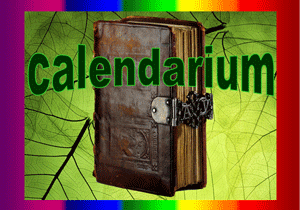Mensis Augustus, oogstmaand, korenmaand, arenmaand
Machteld Roede
calendarium 1, calendarium 2, calendarium 3 en calendarium 4 — januari 1, januari 2 en januari 3 — februari 1, februari 2 en februari 3 — maart 1, maart 2 en maart 3 — april 1, april 2 en april 3 — mei 1, mei 2 en mei 3 — juni 1, juni 2 en juni 3 — juli 1, juli 2 en juli 3 — augustus 1, augustus 2 en augustus 3 — september 1, september 2, september 3 en september 4 — oktober 1, oktober 2, oktober 3 en oktober 4 — november 1, november 2, november 3 en november 4 — december 1, december 2, december 3 en december 4
Augustus gedichten
Oogstlied
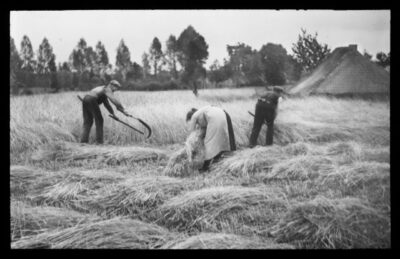
Sikkels klinken;
Sikkels blinken;
Ruischend valt het graan.
Zie de bindster gaâren!
Zie, in lange scharen,
Garf bij garven staan!
‘t Heeter branden
Op de landen
Meldt den middagtijd;
‘t Windje, moê van ‘t zweven,
Heeft zich schuil begeven;
En nog zwoegt de vlijt!
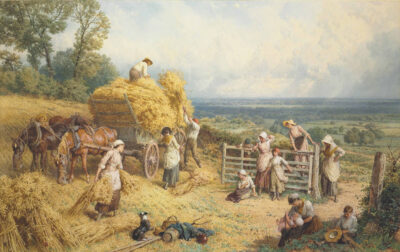
Blinde Maaijers;
Nijv’re Zaaijers,
Die uw loon ontvingt!
Zit nu rustig neder,
Galm’ het mastbosch weder,
Als gij juichend zingt.
Slaat uw oogen
Naar den hoogen
Alles kwam van daar!
Zachte regen daalde,
Vriend’lijk zonlicht straalde
Mild op hal en aar.
A.C.W. Staring (1767-1840), muziek A. Lijsen

Long Island Sound
I see it as it looked one afternoon
In August, — by a fresh soft breeze o’erblown.
The swiftness of the tide, the light thereon,
A far-off sail, white as a crescent moon.
The shining waters with pale currents strewn,
The quiet fishing-smacks, the Eastern cove,
The semi-circle of its dark, green grove.
The luminous grasses, and the merry sun
In the grave sky; the sparkle far and wide,
Laughter of unseen children, cheerful chirp
Of crickets, and low lisp of rippling tide,
Light summer clouds fantastical as sleep
Changing unnoted while I gazed thereon.
All these fair sounds and sights I made my own.
Emma Lazarus (1848-1887)
August Moon (1e couplet)
Look! the round-cheeked moon floats high,
In the glowing August sky,
Quenching all her neighbor stars,
Save the steady flame of Mars.
White as silver shines the sea,
Far-off sails like phantoms be,
Gliding o’er that lake of light,
Vanishing in nether night.
Heavy hangs the tasseled corn,
Sighing for the cordial morn;
But the marshy-meadows bare,
Love this spectral-lighted air,
Drink the dews and lift their song,
Chirp of crickets all night long;
Earth and sea enchanted lie
‘Neath that moon-usurped sky.
Emma Lazarus (1848-1887)[4]
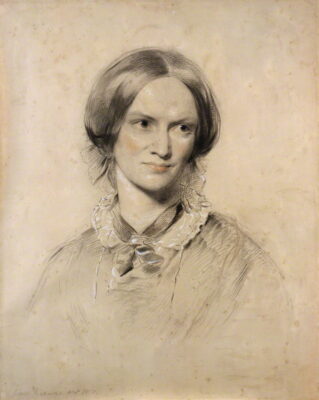
(Uit:) The Wood
Sharp blew the sleet upon my face,
And, rising wild, the gusty wind
Drove on those thundering waves apace,
Our crew so late had left behind;
But, spite of frozen shower and storm,
So close to thee, my heart beat warm,
And tranquil slept my mind.
So now nor foot-sore nor opprest
With walking all this August day,
I taste a heaven in this brief rest,
This gipsy-halt beside the way.
England’s wild flowers are fair to view,
Like balm is England’s summer dew,
Like gold her sunset ray.
Charlotte Bronte (1816-1855)
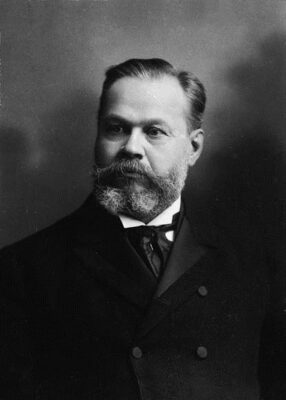
Août
C’est la fenaison; personne ne chôme.
Dès qu’on voit du jour poindre les blancheurs,
En groupes épars, les rudes faucheurs
Vont couper le foin au sauvage arome.
Au bord des ruisseaux, d’indolents pêcheurs
Des saules pensifs dorment sous le dôme ;
Et, le soir venu, l’air qui nous embaume
Apporte déjà d’étranges fraîcheurs.
Mais, quand midi luit sur les fondrières,
Deux à deux, cherchant de blondes clairières
Où la mousse étend son beau tapis vert,
Des couples rieurs vont sous la feuillée
Par un beau ciel d’or tout ensoleillée,
Le panier au bras, mettre le couvert.
Louis-Honoré Fréchette (1839-1908)
Petites misères d’août
Oh! quelle nuit d’étoiles, quelles saturnales!
Oh! mais des galas inconnus
Dans les annales
Sidérales!
Bref, un Ciel absolument nu!
Ô Loi du Rythme sans appel!
Que le moindre Astre certifie
Par son humble chorégraphie
Mais nul spectateur éternel.
Ah! la Terre humanitaire
N’en est pas moins terre-à-terre!
Au contraire.
La Terre, elle est ronde
Comme un pot-au-feu,
C’est un bien pauv’ monde
Dans l’Infini bleu.
Cinq sens seulement, cinq ressorts pour nos Essors….
Ah! ce n’est pas un sort!
Quand donc nos coeurs s’en iront-ils en huit-ressorts! ….
Jules Laforgue (1860-1887)
Mois d’août
Par les branches désordonnées
Le coin d’étang est abrité,
Et là poussent en liberté
Campanules et graminées.
Caché par le tronc d’un sapin,
J’y vais voir, quand midi flamboie,
Les petits oiseaux, pleins de joie,
Se livrer au plaisir du bain.
Aussi vifs que des étincelles,
Ils sautillent de l’onde au sol,
Et l’eau, quand ils prennent leur vol,
Tombe en diamants de leurs ailes.
Mais mon cœur, lassé de souffrir,
En les admirant les envie,
Eux qui ne savent de la vie
Que chanter, aimer et mourir!
François Coppée (1842-1908)[7]

Sie war ein Blümlein
Sie war ein Blümlein hübsch und fein,
Hell aufgeblüht im Sonnenschein.
Er war ein junger Schmetterling,
Der selig an der Blume hing.
Oft kam ein Bienlein mit Gebrumm
Und nascht und säuselt da herum.
Oft kroch ein Käfer kribbelkrab
Am hübschen Blümlein auf und ab.
Ach Gott, wie das dem Schmetterling
So schmerzlich durch die Seele ging.
Doch was am meisten ihn entsetzt,
Das Allerschlimmste kam zuletzt.
Ein alter Esel fraß die ganze
Von ihm so heißgeliebte Pflanze.
Wilhelm Busch (1832-1908)
Couchant d’août
A Reine-Anne
Voici venir vers nous le soir aux yeux de cendre,
Clairs encor d’un reflet de la braise du jour
Dans le couchant d’août, ma mie, allons l’attendre,
Parmi l’or pâlissant de notre été d’amour.
Nous lui dirons: « Sois pur, soir pacifique et tendre,
Fraîcheur des champs brûlés, repos des membres lourds,
Oh! ne te hâte point, soir béni, de descendre
Vers les grands pays d’ombre oh doit finir ton cours!
Laisse-nous savourer ton délice éphémère,
Passant sacré, porteur de l’urne balsamaire
D’où s’épand sur le monde un miel immense et doux.
Nos fronts que le soleil a brunis de son hâle
Déjà penchent … Du moins, prolonge un peu sur nous
Le mystique frisson de l’heure occidentale.
Et nous t’adorerons, ô soir, à deux genoux. »
Anatole le Braz (1859-1926)
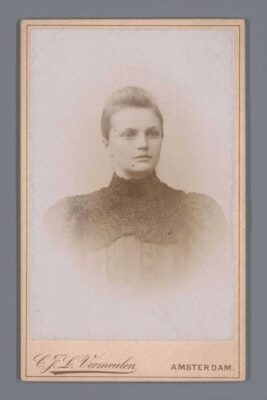
In het hooi
Ik lag in het hooi,
De hemel was mooi,
Mijn bed zacht en goed,
En het geurde zo zoet.
Ik keek met een zucht
Van genot naar de lucht.
Mijn geluk was als dat
Van een spinnende kat.
En ik dacht: Zo meteen
Moet ik op, moet ik heen —
Maar ik weet nog niet, hoe
Ik dat kan, ik dat doe.
Als nu spelenderwijs
Mij de Man met de Zeis
Had gemaaid als het gras,
Dat dit hooi eenmaal was.
Ik behoefde niet op
Meer te staan, niet rechtop
Meer door ‘t leven te gaan …
— En dat lachte mij aan.
Jacqueline E. van der Waals (1868-1922)
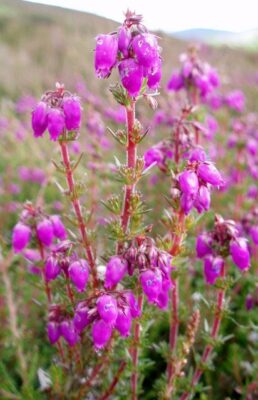
Bloeiende hei
Nu is de heide blij getint
Met paarse bloemenkleur
Nu is de zoete heidewind
Vol zoete honinggeur
Nu gonst de aarde van ‘t gebrom
Der bijen wijd en zijd
Nu is de hoge lucht alom
Een blauwe zaligheid
Maar als de heide schoonste wordt
Dan komt de winter aan
Want bloemenschoon duurt maar kort
En vreugd is gauw gedaan
En ‘k zou mijn leven lang wel graag
Zo lopen door de hei
De vreugde die ik voel vandaag
Is haast te groot voor mij

Jacqueline E. van der Waals (1868-1922)
Август — астры … |
August — asters … |
|
Август — астры, Полновесным, благосклонным Месяц поздних поцелуев, |
August — asters, With benev’lent, sound, befitting Month of tardy, late hour kisses, |
Марина Цветаева (1917) |
Marina Tsvetaeva (1892–1941)[12] |

Август
Как обещало, не обманывая,
Проникло солнце утром рано
Косою полосой шафрановою
От занавеси до дивана.
Оно покрыло жаркой охрою
Соседний лес, дома поселка,
Мою постель, подушку мокрую,
И край стены за книжной полкой.
Я вспомнил, по какому поводу
Слегка увлажнена подушка.
Мне снилось, что ко мне на проводы
Шли по лесу вы друг за дружкой.
Вы шли толпою, врозь и парами,
Вдруг кто-то вспомнил, что сегодня
Шестое августа по-старому,
Преображение Господне.
Обыкновенно свет без пламени
Исходит в этот день с Фавора,
И осень, ясная, как знаменье,
К себе приковывает взоры.
И вы прошли сквозь мелкий, нищенский,
Нагой, трепещущий ольшаник
В имбирно-красный лес кладбищенский,
Горевший, как печатный пряник.
С притихшими его вершинами
Соседствовало небо важно,
И голосами петушиными
Перекликалась даль протяжно.
В лесу казенной землемершею
Стояла смерть среди погоста,
Смотря в лицо мое умершее,
Чтоб вырыть яму мне по росту.
Был всеми ощутим физически
Спокойный голос чей-то рядом.
То прежний голос мой провидческий
Звучал, не тронутый распадом:
«Прощай, лазурь преображенская
И золото второго Спаса
Смягчи последней лаской женскою
Мне горечь рокового часа.
Прощайте, годы безвременщины,
Простимся, бездне унижений
Бросающая вызов женщина!
Я — поле твоего сражения.
Прощай, размах крыла расправленный,
Полета вольное упорство,
И образ мира, в слове явленный,
И творчество, и чудотворство.
Борис Пастернак (1953)
August
This was its promise, held to faithfully:
The early morning sun came in this way
Until the angle of its saffron beam
Between the curtains and the sofa lay,
And with its ochre heat it spread across
The village houses, and the nearby wood,
Upon my bed and on my dampened pillow
And to the corner where the bookcase stood.
Then I recalled the reason why my pillow
Had been so dampened by those tears that fell-
I’d dreamt I saw you coming one by one
Across the wood to wish me your farewell.
You came in ones and twos, a straggling crowd;
Then suddenly someone mentioned a word:
It was the sixth of August, by Old Style,
And the Transfiguration of Our Lord.
For from Mount Tabor usually this day
There comes a light without a flame to shine,
And autumn draws all eyes upon itself
As clear and unmistaken as a sign.
But you came forward through the tiny, stripped,
The pauperly and trembling alder grove,
Into the graveyard’s coppice, russet-red,
Which, like stamped gingerbread, lay there and glowed.
And with the silence of those high treetops
Was neighbour only the imposing sky
And in the echoed crowing of the cocks
The distances and distances rang by:
There in the churchyard underneath the trees,
Like some surveyor from the government
Death gazed on my pale face to estimate
How large a grave would suit my measurement.
All those who stood there could distinctly hear
A quiet voice emerge from where I lay:
The voice was mine, my past; prophetic words
That sounded now, unsullied by decay:
‘Farewell, wonder of azure and of gold
Surrounding the Transfiguration’s power:
Assuage now with a woman’s last caress
The bitterness of my predestined hour!
‘Farewell timeless expanse of passing years!
Farewell, woman who flung your challenge steeled
Against the abyss of humiliations:
For it is I who am your battlefield!
‘Farewell, you span of open wings outspread,
The voluntary obstinacy of flight,
O figure of the world revealed in speech,
Creative genius, wonder-working might!’
Boris Pasternak (1890–1960)
The Heather Fairy
“Ho, Heather, ho! From south to north
Spread now your royal purple forth!
Ho, jolly one! From east to west,
The moorland waiteth to be dressed!”
I come, I come! With footsteps sure
I run to clothe the waiting moor;
From heath to heath I leap and stride
To fling my bounty far and wide.
Cicely Mary Barker (1895-1973)[14]
La Belle Saison
A jeun perdue glacée
Toute seule sans un sou
Une fille de seize ans
Immobile debout
Place de la Concorde
A midi le Quinze Août.
Jacques Prévert (1900-1977)
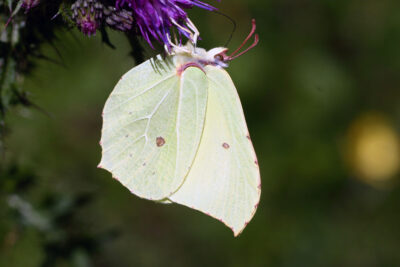
Summer Must Go
Summer has lingered a little too long,
The grass and the trees wear a rusty look,
The calendar cries the last day of August,
And so say the leaves that float down the brook.
The mists hang low in the morning hours,
And the smell of harvest grows more strong.
The calendar cries the last day of August –
And summer has lingered a little too long.
Lenore Hetrick (1926-1994)
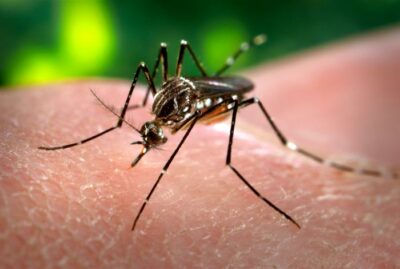
Ek Wil Jou Ken
Jou vabond wag ek sal jou kry
van jou sal net ′n bloedkol bly
Hier op my kamermure
Deur jou vervlakste gonsery
deur jou gebyt en plaery
Kon ek nie slaap vir ure
Mag ek my voorstel eer ons skei
Eer jy die doodslag van my kry
My naam is Van der Merwe
Muskiet wees tog nie treurig nie
Wees ook nie so kieskeurig nie
Jy moet tog eendag sterwe
Verwekker van malaria sing
maar jou laaste area
Nog een minuut vir grasie
Al soebat jy nou nog so lang
al sê jy ook ek is nie bang
Nooit sien jy weer jou nasie
Hoe sedig sit hy ellendeling
sy kinders kan maar kranse bring
Nou gaan die vabond sterwe
Pardoef dis mis daar gaan hy weer
Maar dood sal hy sowaar ek sweer
My naam is Van der Merwe
Swets & Zeitlinger[18]
Cерпень
Мені у потилицю дихає серпень
У вікна близький зазирає Марс.
Я свідомий того, що буваю нестерпним,
Та немає нікого у нас, окрім нас.
Про що семафорять щоночі цикади,
Хіба не про те, що вже скоро зима?
Хіба не про вирок, що з райського саду
Нас обох, наче плід недозрілий вийма?
Ще можна стояти і чути як шкіру
Оголену теплі голублять вітри,
Та вже відлітають лелеки у вирій.
У літа імен усього тільки три:
Червень, Липень і третій — достиглий Серпень,
На пляжі піском розсипаючи час,
Скуповує оптом шарфи та берети,
Щоб осінь бува не заскочила нас
Зненацька. А поки — нас двоє під небом,
І тепло, і море нашіптує сни,
Напиймось любові й нічого не треба
Нам більше, щоб знову діждати весни.
Роман Коляда (1976 Kyiv-)[18]
August
August is breathing on the back of my head,
Mars is peering through the window.
I am aware that I am unbearable,
But there is no one with us, except us.
What do the cicadas semaphore about every night,
Isn’t it about the fact that winter is coming soon?
Isn’t it about the sentence that will take
both of us out of the garden of paradise, like an unripe fruit?
You can still stand and hear how
the warm winds blow the bare skin,
But the storks are already flying away in a whirlwind.
In the summer, there are only three names:
June, July and the third — the ripe August,
On the beach spreading time with sand,
Buys wholesale scarves and berets,
So that autumn does not surprise us
And for now — the two of us under the sky,
And the warmth, and the sea whispering dreams,
Let’s get drunk on love and
we don’t need anything more to feel spring again.
Roman Kolyada (1976-)
[1] Bron: Sikkels klinken, sikkels blinken, Ruischend valt het graan — foto Bernard Eilers (1878-1951)
[2] Bron: Oogsttijd — Myles Birkett Foster (1825-1899)
[3] Bron: Emma Lazarus (1899) — Uit: The poems of Emma Lazarus, T. Johnson and W. Kurtz
[4] Uit: poemhunter.com/poem/august-moon-4 — Emma Lazarus
[5] Bron: Charlotte Bronte — George Richmond krijt op papier, National Portrait Gallery
[6] Bron: Louis-Honoré Fréchette — fotograaf onbekend, Library and Archives Canada, reproduction reference number c002065 and under the MIKAN ID number 3215826
[7] Les mois (1878)
[8] Bron: Wilhelm Busch (circa 1877) — Franz von Lenbach, Hermitage Museum
[9] Bron: Jacqueline E. van der Waals (1890-1915) — foto CJL Vermeulen, Rijksmuseum Amsterdam, RP-F-00-10435
[10] Rode dopheide — foto Gwen and James Anderson / Bell Heather / CC BY-SA 2.0
[11] Bron: Marina Tsvetaeva (1925) — foto Pyotr Ivanovich Shumov
[12] Translated by Alexandra Palmer
[13] Bron: Boris Pasternak (1959) — fotograaf onbekend
[14] Barker, Cicely Mary (1930) Flower Fairies of the Summer. London and Glasgow: Blackie & Son Limited. Rode dopheide.
[15] Uit: M Vasalis (2015) Verzamelde gedichten. Amsterdam: Van Oorschot; Pseudoniem van Margaretha Droogleever Fortuyn-Leenmans
[16] Uit: M Vasalis (1954) Vergezichten en gezichten. Amsterdam: Van Oorschot
[17] Bron: Muskiet (Aedes aegypti), een steekmug die vooral voorkomt in warmere streken en waarvan het wijfje bloed zuigt bij andere dieren en bij mensen en op die manier een aantal dodelijke ziektes kan verspreiden — foto James Gathany
[18] “Gedigte” in Verzen, Deel I (1928). Amsterdam. Te beluisteren: Anneli Van Rooyen (2009) Ek Wil Jou Ken, Album youtube.com/watch?v=EgRPhC7Xv7s
[19] Uit: siver.com.ua/news/serpnevij_virsh/2021-08-02

